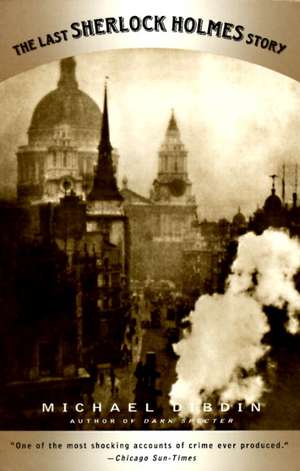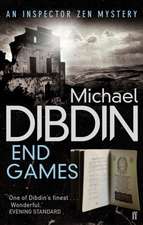The Last Sherlock Holmes Story
Autor Michael Dibdinen Limba Engleză Paperback – 31 dec 1995
As conceived by the award-winning mystery writer Michael Dibdin, The Last Sherlock Holmes Story is a brilliantly inventive updating of the Holmes legend. Pitting master detective against archfiend, steely rationalism against satanic depravity, Dibdin gives us a Holmes who is more complex, more human, and ultimately more fascinating than the one imagined by Arthur Conan Doyle. Here is a riveting combination of history and fiction that confirms Dibdin's reputation as one of the most imaginative and atmospheric crime writers now at work.
Preț: 73.41 lei
Nou
Puncte Express: 110
Preț estimativ în valută:
14.05€ • 14.82$ • 11.71£
14.05€ • 14.82$ • 11.71£
Carte indisponibilă temporar
Doresc să fiu notificat când acest titlu va fi disponibil:
Se trimite...
Preluare comenzi: 021 569.72.76
Specificații
ISBN-13: 9780679766582
ISBN-10: 0679766588
Pagini: 192
Dimensiuni: 132 x 202 x 13 mm
Greutate: 0.22 kg
Editura: Vintage Crime/Black Lizard
ISBN-10: 0679766588
Pagini: 192
Dimensiuni: 132 x 202 x 13 mm
Greutate: 0.22 kg
Editura: Vintage Crime/Black Lizard
Notă biografică
Michael Dibdin was born in England and raised in Northern Ireland. He attended Sussex University and the University of Alberta in Canada. He spent five years in Perugia, Italy, where he taught English at the local university. He went on to live in Oxford, England and Seattle, Washington. He was the author of eighteen novels, eleven of them in the popular Aurelio Zen series, including Ratking, which won the Crime Writers’ Association Gold Dagger, and Cabal, which was awarded the French Grand Prix du Roman Policier. His work has been translated into eighteen languages. He died in 2007.
Extras
One
My notes-which I shall endeavour to follow with the minimum of extraneous comment for the remainder of this narrative-reveal that on the morning of Friday the 28th of September 1888, Sherlock Holmes received a telegram. This was in itself scarcely a remarkable occurrence. At that period telegrams were coming and going with such frequency at 221B Baker Street that I sometimes wonder how many clerks Holmes maintained in permanent employment with the welter of messages he received and dispatched. This state of affairs resulted from a problem which had been developing for several years with regard to Holmes's consulting practice.
The problem was simple, inevitable, and apparently quite insurmountable. It sprang from the fact that crime, like any other human activity, follows a limited number of patterns. Ninety-nine out of a hundred crimes are immediately recognisable to an expert as being of this type or of that. There is no mystery to be solved, no puzzle to tax the brain. All that is required to apprehend the guilty party is hard work and a little luck. Such crimes gladden the heart of the police force, whose capacity for hard work has never been in doubt, but to Holmes they were anathema. His first question on being asked to undertake an investigation was always the same: did it contain any features of interest? If so, he would happily fling all his energies into the task, be his client duchess or dustman, his fees a king's ransom or a beggar's alms. But if the requisite features of interest were absent, nothing would induce him to intervene-and if his hand were forced, as in the matter of the Aldershot scandal of '86, those responsible soon discovered to their chagrin that unless his interest was engaged, Holmes was a mere shadow of the man whose mental powers could seem almost supernatural when they were fully deployed.
Sherlock Holmes originally set up as a consulting detective in 1877, some four years before I met him. Cases were at first hard to come by, but at that time each presented a fresh challenge and was tackled with enthusiasm. Ten years later the position was very different. Like all superior intellects, Holmes disdained to cover the same ground twice, and thus a point was bound to come when he spent less time solving crimes than he did lying about our front room bemoaning the dullness and lack of enterprise of the British criminal class. At such moments he frequently put me in mind of a jaded emperor from the last days of Rome, berating his underlings for their inability to create a spectacle lavish or rare enough to divert him. It was at about this time that he began to resort to cocaine. At first the drug was nothing more than an occasional expedient to which Holmes had recourse when every other weapon for staving off ennui had failed him. I regarded it as a filthy habit, but still preferable to the alternative-unpredictable and savage outbursts of nervous energy in which he would assault the furniture with a horsewhip, or in some still less desirable way relieve the pent-up frustration of his soul. I vividly recall the occasion when he sat himself down with a revolver and a box of cartridges and began firing at the opposite wall, until he had improved its appearance with a script V.R. and crown executed in bullet-pocks. Holmes was a man very finely balanced between reason and hysteria. He liked to compare himself to a racing-engine, which will tear itself to pieces unless coupled to the work that it was designed to do. In the absence of such work the cocaine seemed to act as a regulator, and as such I was prepared to turn a blind eye to his use of it. It seemed at first an acceptable remedy for Holmes's chronic ailment.
But as interesting cases became less and less frequent, the occasional vice became more and more so, until at the period of which I speak Holmes was regularly injecting into his blood a solution of almost standard strength three times a day.* I do not know whether the reader is familiar with the effects of cocaine. By 1972 the drug may have passed for ever from the face of the earth, or, I suppose, be given to squalling children to quiet them. Although without the physically deleterious effect of opium, cocaine is a powerful and dangerous agent when used indiscriminately for personal pleasure, and not-as Nature surely intended-for the relief of pain. The mood of the user is at once exalted to unprecedented heights, only to be subsequently plunged into the most profound lassitude, which of itself demands a renewal of the dosage. Soon the desire for the drug becomes a vicious craving. All one's social and moral standards are undermined, for nothing can offer satisfactions to rival those freely available within the closed circle of one's own mind. In the end, the addict ceases to regard himself as a member of the human race, and by the same token he usually ceases to behave like one. The world and its denizens come to seem a pale and fraudulent imitation of his own fantasies, and he treats them much as a spoiled child treats toys which have ceased to amuse him. Such was the perilous ally to which Sherlock Holmes had turned for relief, and once I realised the extent to which he had come to depend on the drug I strove with all my might to wean him from it. But to no avail. Whatever arguments I advanced, his reply was always the same:
'My dear Watson, nothing would give me greater pleasure than to give it up. Only bring me work! Find me some problem to exercise my intellect, and you may play at darts with my needles for all I care.'
To this I had no answer. Holmes had been stalemated by his own prodigious genius. He had solved every problem, and thereby created one which appeared truly insoluble.
But though the fires burned low, they had not gone out, and since Holmes's fame was now at its zenith his advice was sought on all sides. Hence the telegrams. Every morning after breakfast he so far compromised his indolence as to read through the newspapers, cast an eye over his post, and then fire off cryptic memoranda to various destinations. 'How many rungs had the ladder?' a message might run, or 'If the milk was off, Furneaux is your man.' These oracular pronouncements were dispatched daily all over our islands, and in some cases also to the Continent. They were received generally with gratitude, occasionally with incredulity, but very rarely in vain. Holmes's inferences were almost always proved correct, and where they failed it always subsequently transpired that some fact had been distorted or withheld. Not that his vicarious triumphs appeared to afford Holmes the slightest pleasure. It was a ritual he performed each day, as one might any tedious but necessary duty, and then resumed his brown study.
I was therefore both astonished and delighted when my friend-having read the telegram of which I speak-handed a scribbled reply to the boy, gave out a brief laugh, and began to pace the floor as of old.
'Is it a case, Holmes?' I enquired hopefully. His last investigation, the Cushing horror, had been concluded more than a month before.*
'In a way,' said he, handing me the form in passing.
The telegram was from one of Holmes's old contacts at Scotland Yard. I read: 'Have you been following these Whitechapel killings? I might call later if you are free. We have something fresh. G. Lestrade.'
I looked up in some surprise at Holmes, who chuckled.
'You may not be aware, Watson, that among my other accomplishments I have become something of an expert at interpreting the Scotland Yard dialect. It is an interesting idiom, although its relation to English as we know it is somewhat tenuous. This telegram is a good example. A tiro would never suspect that behind this mask of insouciance there hides a desperate man, a man hounded and harried by the press, by the public, and by his superiors-a man at his wits' end, begging for help! Translated into our common tongue, Lestrade's message reads: "Three women brutally murdered this past month in Whitechapel-more killings expected-all suspects released for lack of evidence-utterly baffled-you are our last hope-for God's sake say you'll see me!"'
'And did you?'
'Oh certainly. One should never miss the spectacle of the police in loco clientis. Besides, this case is of some considerable interest. You have heard of it, of course?'
The question was indeed purely rhetorical. There can have been no one in the kingdom that fateful autumn who was unaware of the terrible events unfolding in the East End. People could talk of nothing else.
'I really didn't imagine you would consider it worth looking into, Holmes,' I answered. 'It all seems rather sordid and disgusting. Hardly your style, I would have thought.'
'Sordid enough and disgusting enough, in all conscience, but redeemed by some quite extraordinary features of interest-as I may be able to show you. Would you have the goodness to hand me down the red volume on the topmost shelf? I must confess that Lestrade's cri de coeur has not come as a complete surprise to me. I have been expecting something of the sort for several weeks now, and to that end I have been compiling a few cuttings on the subject. It is never a good idea to let the constabulary feel that they have you at a disadvantage. It inflames their inherent sense of superiority. Now then, if you are agreeable, I will run over the facts as briefly and clearly as I can. This will be of the greatest benefit to me, in refreshing my grasp of the case.'
'I could wish for nothing better,' said I, and meant it most sincerely. The coolness that had sprung up between us since I announced my engagement had suddenly been dispelled. The cloud I feared had settled for ever on Holmes's spirit had suddenly lifted. The game was afoot once more!
Holmes leafed through the commonplace book with one hand, while with the other he lifted down the Persian slipper containing his tobacco.
'Let me see! "Another Ghastly Murder in Whitechapel." Hm! "Horrible Atrocities of a Maniac." Quite so! "Reign of Terror in East London." "Police Impotent." Dear me! "Fearful Scenes," "Sketches at the Inquest," "Bloodstains on the Stones." Well! The fourth estate has certainly been having a field-day. But once you skim off the froth and the frissons, the actual matter might be copied on to a single sheet of note-paper-such as this one. Now before examining the murders individually we should note the important features they have in common. Each of the victims was a female pauper of doubtful morals. All three were middle-aged, physically unprepossessing, and lacking even a few pence for a bed. They thus had to spend the night in the streets, where they were murdered within a few hundred yards of each other during the early hours of the morning. All of which raises the interesting question of motive, or rather the lack of it. Why should anyone wish to kill these pathetic drabs? Gain is out of the question, and the notion of any of the three being the object of a crime passionel is plainly grotesque. But there is another and even greater mystery, which also stamps the three killings as being the work of the same hand. In each case the weapon used was a knife, and it was wielded not merely to kill but to mutilate. The first victim, Tabram, was stabbed repeatedly in the stomach. The other two had their throats cut and were then disembowelled. It was this that first drew my attention to the case. It makes for something distinctly out of the ordinary. Here is a cutting from the Star, describing the corpse of the second victim, Nicholls.'
I took the open volume from him, and read the following.
The throat is cut in two gashes, the instrument having been a sharp one, but used in a ferocious and reckless way. There is a gash under the left ear, reaching nearly to the centre of the throat. Along half its length, however, it is accompanied by another one which reaches around under the other ear, making a wide and horrible hole, and nearly severing the head from the body. The ghastliness of this cut, however, pales into insignificance alongside the other. No murder was ever more ferociously or more brutally done. The knife, which must have been a large and sharp one, was jabbed into the deceased at the lower part of the abdomen, and then drawn upwards, not once but twice. The first cut veered to the right, slitting up the groin, and passing over the left hip, but the second cut went straight upward, along the centre of the body, and reaching to the breast-bone.
'Good God, Holmes! What manner of man could-
'All in good time, Watson, all in good time. I am not without my ideas, but these are deep waters. We would do well not to theorise in advance of the facts.'
'If I had not read it in the newspaper, I would not have believed it possible. In these days! In our England! Of all the infamies you have ever had to deal with, this must surely be the most abominable!'
'I do not doubt it. Certainly this killer, whoever he may be, is no common criminal. But to continue. Tabram was slain on the seventh of last month, and Nicholls on the thirty-first. Eight days later a third body was discovered, in a yard behind a house in Hanbury Street. Where are my notes of the inquest? Yes: "The throat had been severed. There were two distinct clean cuts. It appeared as though an attempt had been made to separate the bones of the neck." I quote from the evidence of Dr Philips, the police surgeon who examined the victim. "There were various other mutilations of the body but I am of the opinion that they occurred subsequent to death. I think I had better not go into further detail of these mutilations which can only be painful to the feelings of the jury and the public." Humph! Strange scruples, one might think, under the circumstances. The coroner evidently did, for when the inquest resumed he pressed the point. In the words of the Illustrated Police News, "witness then detailed the terrible wounds which had been inflicted upon the woman and described the parts of the body which the perpetrator of the murder had carried away with him." Which is as far as that upstanding organ, the censor morum of our semi-literate class, is prepared to go. Its reticence was shared by the rest of the daily press, including The Times, which termed Dr Philips's evidence "totally unfit for publication". Indeed, one might have been forced to appeal to Lestrade for enlightenment, were it not that you, my dear Watson, still maintain that slender link with the world of medicine: a subscription to the Lancet. That excellent journal was of course under no necessity of sparing its readership, and was thus able to print the unprintable section of Dr Philips's evidence.'
*The standard strength of a cocaine solution for hypodermic injection was set at 10 per cent in the British Pharmacopoeia of 1898. According to 'The Sign of Four', Holmes used a 7 per cent solution.
*For further details of the Cushing case, see Conan Doyle's 'The Adventure of the Cardboard Box'.
My notes-which I shall endeavour to follow with the minimum of extraneous comment for the remainder of this narrative-reveal that on the morning of Friday the 28th of September 1888, Sherlock Holmes received a telegram. This was in itself scarcely a remarkable occurrence. At that period telegrams were coming and going with such frequency at 221B Baker Street that I sometimes wonder how many clerks Holmes maintained in permanent employment with the welter of messages he received and dispatched. This state of affairs resulted from a problem which had been developing for several years with regard to Holmes's consulting practice.
The problem was simple, inevitable, and apparently quite insurmountable. It sprang from the fact that crime, like any other human activity, follows a limited number of patterns. Ninety-nine out of a hundred crimes are immediately recognisable to an expert as being of this type or of that. There is no mystery to be solved, no puzzle to tax the brain. All that is required to apprehend the guilty party is hard work and a little luck. Such crimes gladden the heart of the police force, whose capacity for hard work has never been in doubt, but to Holmes they were anathema. His first question on being asked to undertake an investigation was always the same: did it contain any features of interest? If so, he would happily fling all his energies into the task, be his client duchess or dustman, his fees a king's ransom or a beggar's alms. But if the requisite features of interest were absent, nothing would induce him to intervene-and if his hand were forced, as in the matter of the Aldershot scandal of '86, those responsible soon discovered to their chagrin that unless his interest was engaged, Holmes was a mere shadow of the man whose mental powers could seem almost supernatural when they were fully deployed.
Sherlock Holmes originally set up as a consulting detective in 1877, some four years before I met him. Cases were at first hard to come by, but at that time each presented a fresh challenge and was tackled with enthusiasm. Ten years later the position was very different. Like all superior intellects, Holmes disdained to cover the same ground twice, and thus a point was bound to come when he spent less time solving crimes than he did lying about our front room bemoaning the dullness and lack of enterprise of the British criminal class. At such moments he frequently put me in mind of a jaded emperor from the last days of Rome, berating his underlings for their inability to create a spectacle lavish or rare enough to divert him. It was at about this time that he began to resort to cocaine. At first the drug was nothing more than an occasional expedient to which Holmes had recourse when every other weapon for staving off ennui had failed him. I regarded it as a filthy habit, but still preferable to the alternative-unpredictable and savage outbursts of nervous energy in which he would assault the furniture with a horsewhip, or in some still less desirable way relieve the pent-up frustration of his soul. I vividly recall the occasion when he sat himself down with a revolver and a box of cartridges and began firing at the opposite wall, until he had improved its appearance with a script V.R. and crown executed in bullet-pocks. Holmes was a man very finely balanced between reason and hysteria. He liked to compare himself to a racing-engine, which will tear itself to pieces unless coupled to the work that it was designed to do. In the absence of such work the cocaine seemed to act as a regulator, and as such I was prepared to turn a blind eye to his use of it. It seemed at first an acceptable remedy for Holmes's chronic ailment.
But as interesting cases became less and less frequent, the occasional vice became more and more so, until at the period of which I speak Holmes was regularly injecting into his blood a solution of almost standard strength three times a day.* I do not know whether the reader is familiar with the effects of cocaine. By 1972 the drug may have passed for ever from the face of the earth, or, I suppose, be given to squalling children to quiet them. Although without the physically deleterious effect of opium, cocaine is a powerful and dangerous agent when used indiscriminately for personal pleasure, and not-as Nature surely intended-for the relief of pain. The mood of the user is at once exalted to unprecedented heights, only to be subsequently plunged into the most profound lassitude, which of itself demands a renewal of the dosage. Soon the desire for the drug becomes a vicious craving. All one's social and moral standards are undermined, for nothing can offer satisfactions to rival those freely available within the closed circle of one's own mind. In the end, the addict ceases to regard himself as a member of the human race, and by the same token he usually ceases to behave like one. The world and its denizens come to seem a pale and fraudulent imitation of his own fantasies, and he treats them much as a spoiled child treats toys which have ceased to amuse him. Such was the perilous ally to which Sherlock Holmes had turned for relief, and once I realised the extent to which he had come to depend on the drug I strove with all my might to wean him from it. But to no avail. Whatever arguments I advanced, his reply was always the same:
'My dear Watson, nothing would give me greater pleasure than to give it up. Only bring me work! Find me some problem to exercise my intellect, and you may play at darts with my needles for all I care.'
To this I had no answer. Holmes had been stalemated by his own prodigious genius. He had solved every problem, and thereby created one which appeared truly insoluble.
But though the fires burned low, they had not gone out, and since Holmes's fame was now at its zenith his advice was sought on all sides. Hence the telegrams. Every morning after breakfast he so far compromised his indolence as to read through the newspapers, cast an eye over his post, and then fire off cryptic memoranda to various destinations. 'How many rungs had the ladder?' a message might run, or 'If the milk was off, Furneaux is your man.' These oracular pronouncements were dispatched daily all over our islands, and in some cases also to the Continent. They were received generally with gratitude, occasionally with incredulity, but very rarely in vain. Holmes's inferences were almost always proved correct, and where they failed it always subsequently transpired that some fact had been distorted or withheld. Not that his vicarious triumphs appeared to afford Holmes the slightest pleasure. It was a ritual he performed each day, as one might any tedious but necessary duty, and then resumed his brown study.
I was therefore both astonished and delighted when my friend-having read the telegram of which I speak-handed a scribbled reply to the boy, gave out a brief laugh, and began to pace the floor as of old.
'Is it a case, Holmes?' I enquired hopefully. His last investigation, the Cushing horror, had been concluded more than a month before.*
'In a way,' said he, handing me the form in passing.
The telegram was from one of Holmes's old contacts at Scotland Yard. I read: 'Have you been following these Whitechapel killings? I might call later if you are free. We have something fresh. G. Lestrade.'
I looked up in some surprise at Holmes, who chuckled.
'You may not be aware, Watson, that among my other accomplishments I have become something of an expert at interpreting the Scotland Yard dialect. It is an interesting idiom, although its relation to English as we know it is somewhat tenuous. This telegram is a good example. A tiro would never suspect that behind this mask of insouciance there hides a desperate man, a man hounded and harried by the press, by the public, and by his superiors-a man at his wits' end, begging for help! Translated into our common tongue, Lestrade's message reads: "Three women brutally murdered this past month in Whitechapel-more killings expected-all suspects released for lack of evidence-utterly baffled-you are our last hope-for God's sake say you'll see me!"'
'And did you?'
'Oh certainly. One should never miss the spectacle of the police in loco clientis. Besides, this case is of some considerable interest. You have heard of it, of course?'
The question was indeed purely rhetorical. There can have been no one in the kingdom that fateful autumn who was unaware of the terrible events unfolding in the East End. People could talk of nothing else.
'I really didn't imagine you would consider it worth looking into, Holmes,' I answered. 'It all seems rather sordid and disgusting. Hardly your style, I would have thought.'
'Sordid enough and disgusting enough, in all conscience, but redeemed by some quite extraordinary features of interest-as I may be able to show you. Would you have the goodness to hand me down the red volume on the topmost shelf? I must confess that Lestrade's cri de coeur has not come as a complete surprise to me. I have been expecting something of the sort for several weeks now, and to that end I have been compiling a few cuttings on the subject. It is never a good idea to let the constabulary feel that they have you at a disadvantage. It inflames their inherent sense of superiority. Now then, if you are agreeable, I will run over the facts as briefly and clearly as I can. This will be of the greatest benefit to me, in refreshing my grasp of the case.'
'I could wish for nothing better,' said I, and meant it most sincerely. The coolness that had sprung up between us since I announced my engagement had suddenly been dispelled. The cloud I feared had settled for ever on Holmes's spirit had suddenly lifted. The game was afoot once more!
Holmes leafed through the commonplace book with one hand, while with the other he lifted down the Persian slipper containing his tobacco.
'Let me see! "Another Ghastly Murder in Whitechapel." Hm! "Horrible Atrocities of a Maniac." Quite so! "Reign of Terror in East London." "Police Impotent." Dear me! "Fearful Scenes," "Sketches at the Inquest," "Bloodstains on the Stones." Well! The fourth estate has certainly been having a field-day. But once you skim off the froth and the frissons, the actual matter might be copied on to a single sheet of note-paper-such as this one. Now before examining the murders individually we should note the important features they have in common. Each of the victims was a female pauper of doubtful morals. All three were middle-aged, physically unprepossessing, and lacking even a few pence for a bed. They thus had to spend the night in the streets, where they were murdered within a few hundred yards of each other during the early hours of the morning. All of which raises the interesting question of motive, or rather the lack of it. Why should anyone wish to kill these pathetic drabs? Gain is out of the question, and the notion of any of the three being the object of a crime passionel is plainly grotesque. But there is another and even greater mystery, which also stamps the three killings as being the work of the same hand. In each case the weapon used was a knife, and it was wielded not merely to kill but to mutilate. The first victim, Tabram, was stabbed repeatedly in the stomach. The other two had their throats cut and were then disembowelled. It was this that first drew my attention to the case. It makes for something distinctly out of the ordinary. Here is a cutting from the Star, describing the corpse of the second victim, Nicholls.'
I took the open volume from him, and read the following.
The throat is cut in two gashes, the instrument having been a sharp one, but used in a ferocious and reckless way. There is a gash under the left ear, reaching nearly to the centre of the throat. Along half its length, however, it is accompanied by another one which reaches around under the other ear, making a wide and horrible hole, and nearly severing the head from the body. The ghastliness of this cut, however, pales into insignificance alongside the other. No murder was ever more ferociously or more brutally done. The knife, which must have been a large and sharp one, was jabbed into the deceased at the lower part of the abdomen, and then drawn upwards, not once but twice. The first cut veered to the right, slitting up the groin, and passing over the left hip, but the second cut went straight upward, along the centre of the body, and reaching to the breast-bone.
'Good God, Holmes! What manner of man could-
'All in good time, Watson, all in good time. I am not without my ideas, but these are deep waters. We would do well not to theorise in advance of the facts.'
'If I had not read it in the newspaper, I would not have believed it possible. In these days! In our England! Of all the infamies you have ever had to deal with, this must surely be the most abominable!'
'I do not doubt it. Certainly this killer, whoever he may be, is no common criminal. But to continue. Tabram was slain on the seventh of last month, and Nicholls on the thirty-first. Eight days later a third body was discovered, in a yard behind a house in Hanbury Street. Where are my notes of the inquest? Yes: "The throat had been severed. There were two distinct clean cuts. It appeared as though an attempt had been made to separate the bones of the neck." I quote from the evidence of Dr Philips, the police surgeon who examined the victim. "There were various other mutilations of the body but I am of the opinion that they occurred subsequent to death. I think I had better not go into further detail of these mutilations which can only be painful to the feelings of the jury and the public." Humph! Strange scruples, one might think, under the circumstances. The coroner evidently did, for when the inquest resumed he pressed the point. In the words of the Illustrated Police News, "witness then detailed the terrible wounds which had been inflicted upon the woman and described the parts of the body which the perpetrator of the murder had carried away with him." Which is as far as that upstanding organ, the censor morum of our semi-literate class, is prepared to go. Its reticence was shared by the rest of the daily press, including The Times, which termed Dr Philips's evidence "totally unfit for publication". Indeed, one might have been forced to appeal to Lestrade for enlightenment, were it not that you, my dear Watson, still maintain that slender link with the world of medicine: a subscription to the Lancet. That excellent journal was of course under no necessity of sparing its readership, and was thus able to print the unprintable section of Dr Philips's evidence.'
*The standard strength of a cocaine solution for hypodermic injection was set at 10 per cent in the British Pharmacopoeia of 1898. According to 'The Sign of Four', Holmes used a 7 per cent solution.
*For further details of the Cushing case, see Conan Doyle's 'The Adventure of the Cardboard Box'.
Recenzii
"One of the most shocking accounts of crime ever produced."
—Chicago Sun-Times
"Dibdin in one of the best detective novelists around."
—London Daily Mail
"An explosive, controversial book . . . . A horrible thread of reality runs through the tale as it does in no other Sherlock Holmes story, for the Whitechapel murders were real."
—Baltimore Sun
—Chicago Sun-Times
"Dibdin in one of the best detective novelists around."
—London Daily Mail
"An explosive, controversial book . . . . A horrible thread of reality runs through the tale as it does in no other Sherlock Holmes story, for the Whitechapel murders were real."
—Baltimore Sun
Textul de pe ultima copertă
In 1888 Sherlock Holmes is languishing for a criminal case worthy of his powers, then one materializes, heralded by the spatter of gore and the shriek of headlines. For in vice-ridden Whitechapel, three female paupers of dubious morals have been murdered, their bodies hideously defiled. And in taunting letters their killer announces his intention to strike again - and signs his name "Jack the Ripper". As conceived by the award-winning mystery writer Michael Dibdin, The Last Sherlock Holmes Story is a brilliantly inventive updating of the Holmes legend. Pitting master detective against archfiend, steely rationalism against satanic depravity, Dibdin gives us a Holmes who is more complex, more human, and ultimately more fascinating than the one imagined by Arthur Conan Doyle.
Descriere
In The Last Sherlock Holmes Story, Michael Dibdin pits the sleuth of Baker Street against the Butcher of Whitechapel--the archfiend Jack the Ripper. In doing so, he gives readers a Holmes possessed of greater and more disturbing depths than the one they thought they knew.











